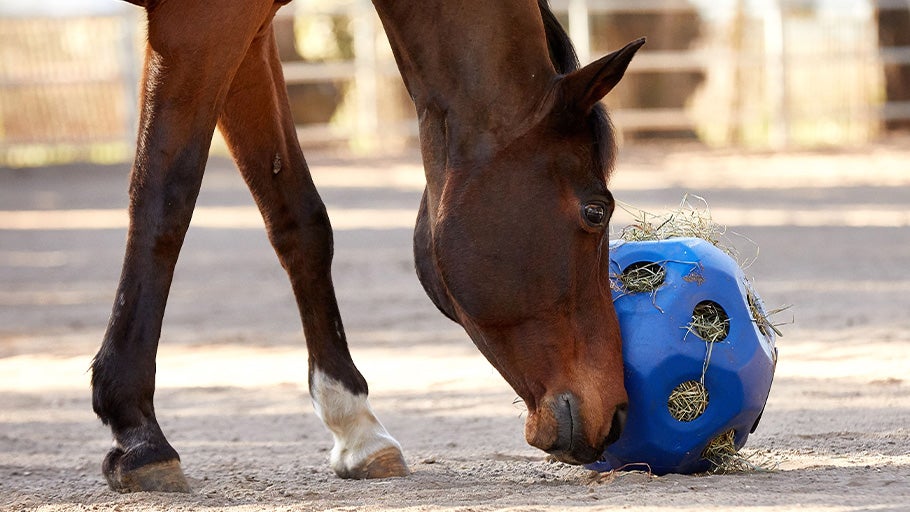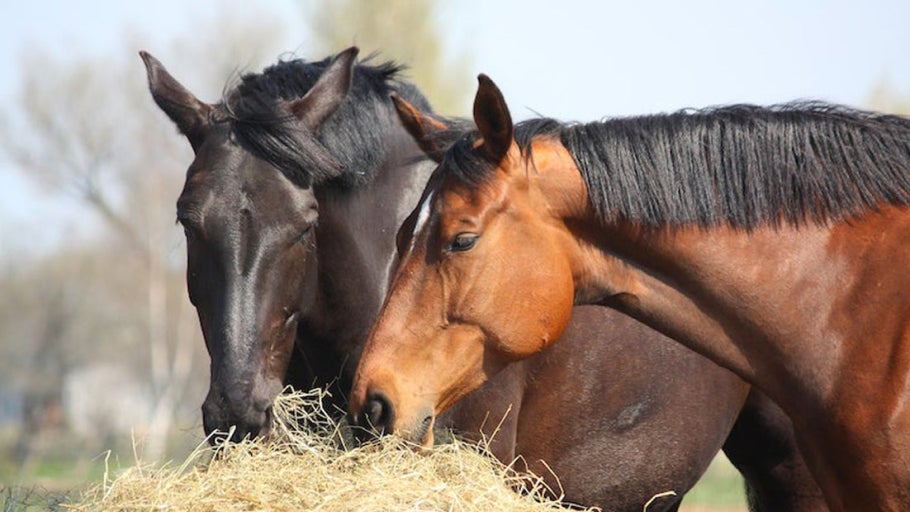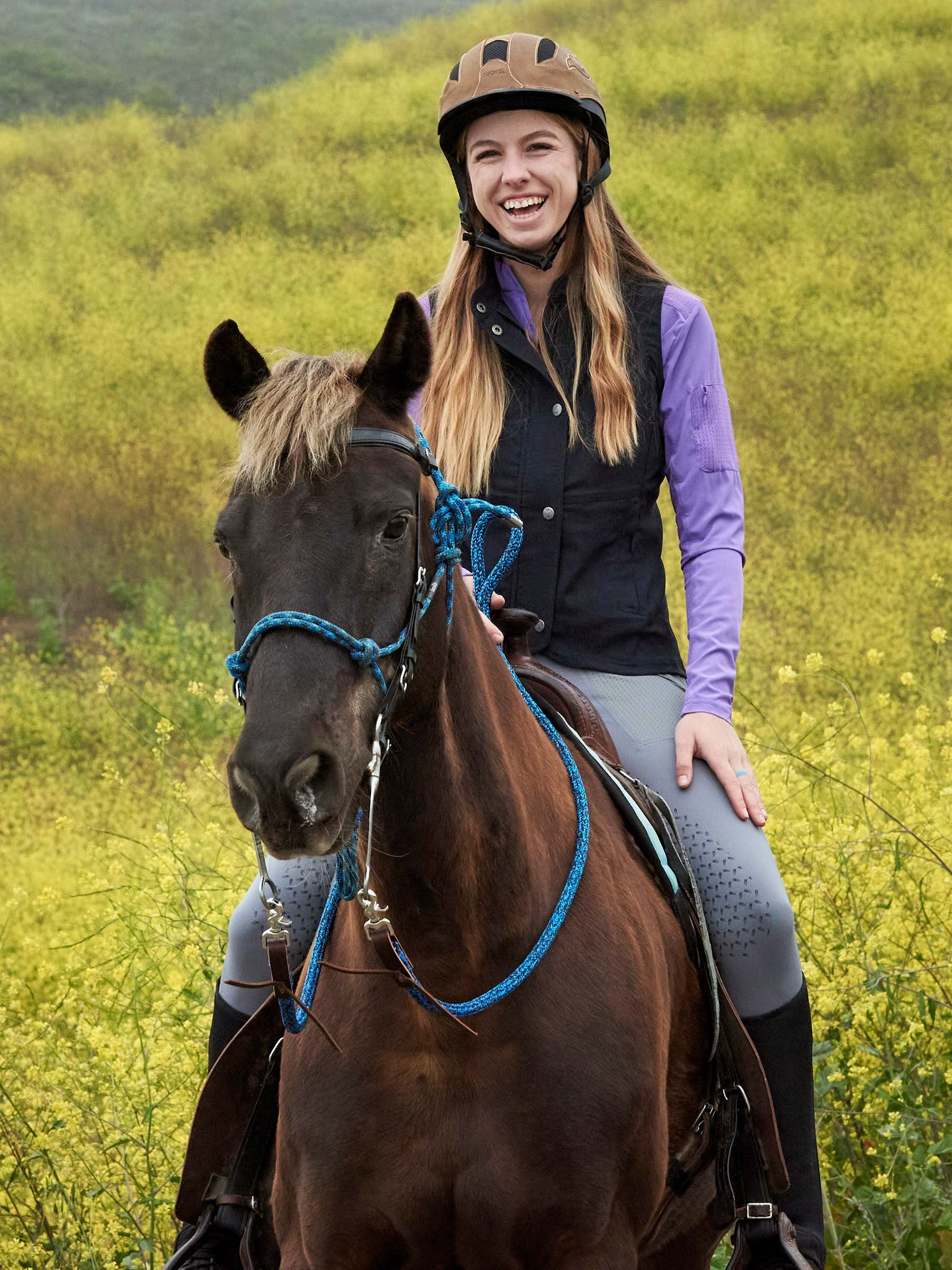
The Best Slow Feeders for Horses
While most know that horses are meant to graze 24/7, not all horse owners are able to provide a big, green pasture for their equine companions. Slow feeders are a great alternative to grazing if you have limited access to a pasture. Slower feeding can be beneficial for horses prone to certain conditions like foundering, laminitis, or ulcers. Available in many different forms, slow feeders can also improve your horse's overall health and well-being. Below, we have narrowed down our favorite products and answered some commonly asked questions to make your slow feeding choices a bit less daunting!
Factors to Consider
There are important factors to keep in mind when choosing a slow feeder; it is not a one-size-fits-all solution! Material, hole size, hay type, and horse age or size all influence your equine's comfort or irritability during their hay consumption. If your horse is destroying your slow feeder or eating too quickly (continuing weight issues), it is time to reexamine your slow feeder and hay combination. Please refer to the handy chart below for a general guideline:
| Hole Size | Hay Type | Horse Age/Size |
| 0.5" - 1" | Grass, Chopped, Medium to Coarse Hay | Minis, Ponies, Donkeys, Mules, & Indulgent Horses |
| 1.5" | Longer Grass, Chopped, Alfalfa, Bermuda, Fine Hay | Young & Most Horses (Used to Hay Nets/Bags) |
| 1.75" - 2" | Grass, Timothy, Alfalfa, Forage, Thick to Coarse Hay | Anxious & Older Horses, Drafts, Warmbloods |
| 3" - 4" | Long-Stemmed, Straw, All Hays | Special Needs/Senior Horses, Cattle |
Finding the right feeder and hay combo can take trial and error with different hole sizes. Horses have different learning speeds, personalities, and patience when it comes to slow feeding. Be mentally prepared to invest time, money, and effort into helping your horse accept the concept, especially if you are introducing slow feeding for the first time.
Most Durable Hay Net
NibbleNet Slow Feeder
This feeder was designed to simulate grazing, with a one-bite-at-a-time concept for a more natural method of feeding. Made in the USA from heavy-duty vinyl and poly webbing, this slow feeder holds up against even the toughest of horses. With different hole sizes to choose from, you can customize your NibbleNet to your specific horse and hay needs. Stainless steel hardware and nylon straps ensure security and durability for daily feeding.
Best Round Bale Hay Net
Tough 1 Round Bale Hay Net
The Round Bale Hay Net from Tough 1 is specifically constructed to net an entire round bale of hay for horses in the pasture. It is made from a tough poly cord that won't stretch over time, helping to prevent hay waste. Ideal for feeding a larger group of horses, this hay net also comes with a repair kit for fixing possible rips and tears. You can feel secure knowing that speedy eaters will be effectively slowed down by the 1.5" or 2.5" hole openings.
Easiest to Fill Hay Bag
Weaver Breathable Easy Fill Hay Bag
While this hay bag is not technically a "slow feeder" per se, we cannot ignore its accessibility! With a simple, wide top opening and fun patterns, loading and securing your hay in style is a breeze. Constructed from durable Cordura nylon, this bag is durable against destructive horses. The large front hole opening is good for horses easily frustrated by the small openings of slow feeders. Mesh panels on each side and back of the net ensure breathability. Ease your horse's mental well-being with this handy option for your barn or trailer.
Best Hay Bag for Horse Trailers
Professionals Choice Scratch-Free Hay Bag
This scratch-free hay bag is ideal for trailering, showing, or camping. This hay bag does not have any metal hardware, preventing the possibility of scratches on your trailer. This option is great for overnight camping when your horse is tied to your trailer, since the absence of hardware will lessen the sound from noisy eaters. The top drawstring closure provides access for top loading and adjusting your hay bag's height. Reinforced nylon webbing and the 3" x 2" openings make this bag perfect for traveling.
Best Boredom Buster Hay Ball
Equi-Essential Hay Ball
This hay ball is the go-to slow feeder to beat boredom. The unique shape entertains your horse by allowing them to play and push the hay ball around without letting it roll too far away. It can also be hung on the stall like a standard hay bag if preferred. This hard plastic hay ball is 16" in diameter and weighs about 4.5 lb when not filled with hay. It has a 4.75" screw opening to fill and twelve 2.75" openings for your horse to eat from. The hay ball can hold up to 7 lb of hay and is ideal for one horse—especially a playful one!
Most Versatile Hay Net
Tough 1 Slow Feed Web Hay Net
This slow feed hay net is a fantastic choice, no matter whether your horse is turned out, in a stall, or on the go. Constructed from 1" webbing, this net features small 2" by 2" openings that will help quick eaters slow their pace down. The plastic frame-in webbing makes loading the net with hay a breeze, and added straps on the lower back enable the net to be securely attached wherever you choose to feed your horse. From home to wherever your travels take you, this hay net is sure to satisfy your horse's slow feeding needs!
Smallest Hay Net Hole Size
Shires Greedy Feeder Slow Hay Net
This slow-feeder net is a great option for universal use. If you have a horse that is particularly prone to gorge and overeat, this 'greedy' feeder has smaller-sized 1" holes to really help prevent them from eating too much too quickly. With different hay capacity options to choose from, you can also easily monitor your horse's intake. This hay net is particularly helpful for horses that are a little too efficient at pulling wads of hay out from slow feeders; the smaller holes on this net ensure your horse has to work even harder for their food, naturally slowing them down more. Bring on the mental stimulation for those indulgent eaters!
Best Long-Term Hay Bag
GG Equine HayPlay Bag XL
The perfect solution for long-term slow feeding, the GG Equine HayPay Bag is designed to allow your horse to eat in a natural head-down position. This feeder will hold almost a full bale of hay while keeping it contained, resulting in cleaner hay and less waste. Non-toxic, weatherproof, and PVC-coated, this hay bag can withstand extreme temperature fluctuations without weakening. A solid back side enables ground feeding, or you can hang this bag by the heavy-duty mounting holes for stall use. This easy-to-fill hay bag is ideal for any horse with triple-reinforced 3" holes that provide frustration-free feeding for your best equine friend!
Best Slow Feeder for Laminitis
Kiwi Helix Slow Feeder Gen II
Well-suited for managing horses with laminitis, the Kiwi Helix Adjustable Collapsible Slow Feeder Gen II makes slow feeding as easy as can be. This feeder allows you to soak hay easily and will drain itself as your horse eats. The design mimics the natural head-down grazing position, and the feeder never obscures your horse's vision—it collapses as they munch away! With its unique construction of no strings, netting, or ropes, even shod horses are much less prone to geting tangled or caught. A reinforced, durable mesh construction makes the feeder sturdy enough for even the most enthusiastic of eaters, while providing a safe slow feeding experience for laminitic horses and all of their equine pals!
Frequently Asked Questions
My horse is aggressive during feeding time, would a slow feeder help?
Slow feeders are helpful in managing aggressive food behaviors in horses. Bad habits like cribbing are usually caused by underlying issues, such as boredom. Slow feeders give bored or aggressive horses a positive energy outlet. Ulcers can be caused when stomach acid levels rise due to too long a time between feedings, leading to other negative behaviors. Slow feeders give your horse a steady feeding schedule to help protect against ulcers and their side effects. Horses that are anxious during feeding times can develop food-related stress. Slow feeders provide constant access to food and, therefore, can help lower stress levels and prevent poor or aggressive behaviors. If you are considering slow feeding your horse for the first time, learn How to Introduce a Slow Feeder for a smoother transition!
What hole size do I choose?
It is best to choose a hole size that will slow down eating to mimic the grazing effect, but not one small enough to cause exasperation in your horse. If your horse is refusing to eat at all with a slow feeder, they are likely too frustrated. It is best to introduce slow feeders with a larger hole size, then move to smaller holes after your horse adjusts to the slow feeder concept. If you are interested in more insight into a crew member's experience with transitioning horses to slow feeding, check out Alison's review!
Are slow feeders safe for horses?
Slow feeders are quite safe when used properly. It is important to purchase a hay net or bag that is made of high-quality materials to prevent breakage of the feeder or hazards to your horse. Be sure the slow feeder is secured to prevent swaying, and any excess rope or straps are tucked away. Shod horses can get shoe nails stuck or shoes pulled off if snagged on a hay net; make certain your slow feeder is hung high enough to prevent entanglement, but low enough for a normal eating position. Improper height placement can cause neck and back issues in your horse. If you feel a slow feeder hay bag or net is not quite right for your horse's feeding environment, we encourage you to learn more about the different Types of Horse Feeders.
Are hay nets bad for your horse's teeth?
Hay nets are not bad for your horse's teeth as long as they are high-quality nylon or polyester and are not constructed from steel, wire, or metal parts. However, that is not to say that metal feeders or grates are necessarily detrimental to your horse's dental health. Slow feeding can actually help manage dental risks caused by underlying conditions, such as laminitis or high-sugar diets. If your horse does experience any dental issues with a hay net or slow feeder, please consult your veterinarian immediately.
Closing Thoughts
We hope this guide has helped alleviate any personal doubts in choosing a slow feeder. Your horse's eating habits are extremely important for a longstanding equine relationship, and it is smart to consider what kind of hay you're feeding to determine which slow feeder size/capacity would be most ideal. We encourage you to check out all of our slow feeder and hay bag options below, to make a more informed decision about which option is best for your equine's needs and overall health. If you have any lingering questions, feel free to reach out to our friendly customer service team at 1(800)620-9145 or info@ridingwarehouse.com for assistance. Happy feeding!
Related Articles:











